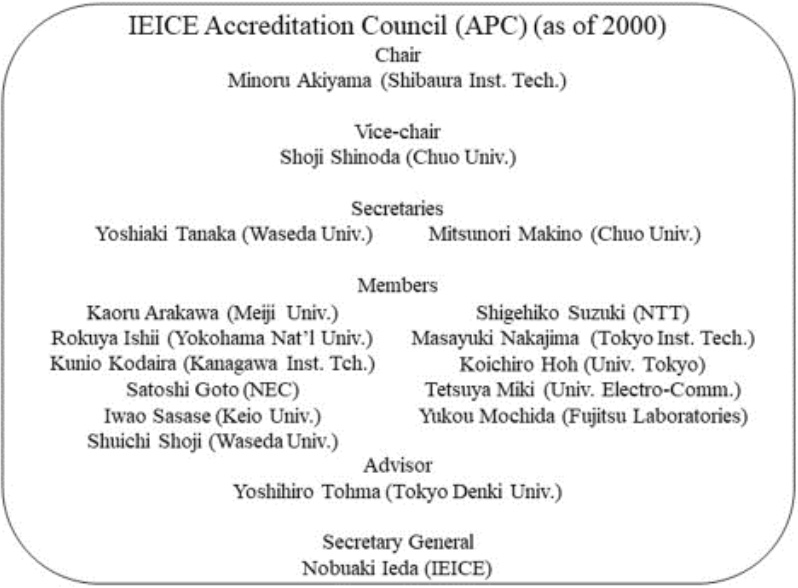
Shoji SHINODA


IEICE has been one of the major academic societies among the regular members of the Japan Accreditation Board for Engineering Education (JABEE) since the establishment of JABEE on November 19, 1999.
Dr. Shinoda joined as a key member from IEICE to the Criteria & Evaluation Committee of JABEE on January 19, 2000. After his consultation with Prof. Minoru Akiyama who was a representative from IEICE to the Steering Committee of JABEE, Dr. Shinoda set up the IEICE Accreditation Policy Council (APC) in May 2000. The starting members of APC are shown in Fig.1.
Dr. Shinoda already had key information about both the Engineering Criteria 2000 (EC2000) of the Accreditation Board for Engineering and Technology (ABET) in USA and the Washington Accord (WA) of an international accord of representative bodies accrediting bachelor level engineering education programs of 4-year Higher Education Institutions (HEIs) in USA, UK, Canada, Ireland, Australia and New Zealand.
Based on his knowledge of the essence of EC2000 including gthe challenging idea of shifting the basis for accreditation from what is taught to what is learned,h Dr. Shinoda led APC members to design the bachelor-level Program-specific Criteria for IEICE fields of technical interest (which have been linked substantially to a pair of ecommunication, computer, software, and similarly named engineering bachelor-level Category-/Discipline-specific Criteriaf and eelectrical, electronic and similarly named engineering bachelor-level Category-/Discipline-specific Criteriaf for present IEICE fields), in advance of other engineering bachelor-level Category-/Discipline-specific Criteria, as applied together with the eCommon Criteriaf for engineering bachelor-level education programs of JABEE.
The main role of APC is to coordinate issues among IEICE, JABEE and related major academic societies, through delegating its members to various JABEE committees, which include formation of evaluation teams to engineering education programs applying for accreditation to JABEE. Dr. Shinoda was delegated to the Criteria & Pilot-run Committee on July 10, 2001, the Criteria & Evaluation Coordination Committee on June 10, 2002, and the Criteria Commission as well as the Accreditation Commission on May 13, 2003, in JABEE.
Since then, JABEE has been working to assure the quality of engineering education programs at bachelor-level HEIs which establish, implement, evaluate and improve education as defined in the JABEE Accreditation Engineering Criteria (consisting of Common Criteria and Category-/Discipline-specific Criteria) in Japan, by a system of sure, fair and equitable evaluation and by only accrediting engineering education programs which achieve benchmarks as required by the society based on the JABEE Accreditation CriteriaCwith the cooperation of major academic societies like IEICE, and by publishing the graduates of engineering programs as those that have achieved learning outcomes as defined by the engineering program.
Dr. Shinoda was invited to give a talk (1) about gAn overview of existing and developing accreditation systems in Japanh on November 7, 2004, at the IEEE Engineering Accreditation Workshop 2004 (for November 6-8, 2004) in Bangkok, Thailand.
JABEE became a signatory to the WA in 2005. However, in the report produced by the WAfs 2005 Review Team providing a critique of the JABEE system, it was pointed out that, most Japanese engineering programs emphasize the learning of relevant scientific principles more than the application of those principles in a design context.
Since then, JABEE has clearly put considerable effort into notifying and engaging with HEIs regarding, in particular, aspects of design and teamwork, and JABEE has improved the JABEE Criteria Guide on engineering education programs at bachelor-level without changing the JABEE Criteria.
While deepening his recognition that engineering design plays the most important part in engineering activities, Dr. Shinoda has investigated, by on-site visits with Dr. H. Fukusaki, Prof. I. Ohnaka, Prof. T. Miki, Dr. Y. Mochida, Prof. M. Sengoku, or Prof. M. Makino, actual engineering design educations (if possible, including methods of assessment and evaluation of studentsf performances in engineering design, such as by use of scoring rubrics) in bachelor-level programs accredited by the WA signatories of USA, Canada, UK, and Ireland, as well as those outside the jurisdictions (countries and regions) of WA signatories. Such investigations are absolutely essential for accredited programs by JABEE and JABEE itself to improve the engineering design education and its evaluation for internationally substantial equivalency under the WA, given that JABEE has been a signatory of WA.
Dr. Shinoda has authored many papers (2)-(9) on engineering education innovation focusing on learning outcomes and has given talks or speeches including a plenary talk(10) at the ITC-CSCC 2013 (Yoesu, Korea), and has disseminated information over many years that enhances the quality of education in the fields of electrical engineering, electronics, information, communications and related engineering fields, resulting in making a clear contribution to the development of human resources.
As shown above, his achievements and contributions to higher education including engineering education have been outstanding, and we are convinced that he fully deserves to be a recipient of the IEICE Achievement Award for the category of outstanding education activities.